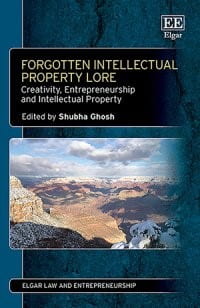Congratulations to Professor Mark Perry on the publication of his latest book chapter “The Legacy of The Seasons: confusion and misdirection” in Forgotten Intellectual Property Lore, 2020, Edward Elgar Publishing.
In the chapter Mark looks at the history behind the confusion over the basis for copyright, and ponders over the idea of recognising common law copyright as a concept, even though it either never existed or has been subsequently removed by legislation.
Mark said he began work on this paper in 1993, when he was working on his thesis about Crown Copyright at Auckland University, but it was not directly pertinent to the thesis and only got a by-line. ‘I’ve had many thoughts over 25 plus years on this, but the time seemed right and completely different from my current day job, so it was a bit relaxing to work on this short version. Also, a lot more historical material has become available online.’
Following is the abstract from his chapter:
The eighteenth century was an exciting time in the development of some of the key values that we take for granted in our current framework of intellectual property, not least the Statute of Anne, Copyright Act 1709 8 Ann. c.21(Gr. Brit), or “An Act for the Encouragement of Learning, by vesting the Copies of Printed Books in the Authors or purchasers of such Copies, during the Times therein mentioned”. However, some of the assumptions made as to that era were not as clear as some of the major copyright texts of the twentieth century suggested, and indeed remain confused to this day.
In many standard copyright texts late last century, and even repeated sometimes today, the accepted approach was that prior to the Statute of Anne there had clearly been a developed doctrine of copyright at common law, as held by the Court of King’s Bench in Millar v Taylor (1769) (4 Burr. 2303, 98 ER 201). This so-called right at common law, it was stated, was merely subsumed by the Statute of Anne. Such texts also come to the conclusion that the House of Lords in the subsequent Donaldson v Beckett (1774) (The Parliamentary History of England vol XVII (1771-1774) Proceedings in the Lords on the Question of Literary Property (1774) 954), decided that although a perpetual copyright did exist under the common law, the right was “impeached” by the Statute of Anne 1710 for published works. One of the problems was that an incomplete report is also given in 4 Burr 2408; 98 ER 257 and in 2 Bro PC 129; 1 ER 837, and these reports are limited in their description of the action.
A major US text of the 1970s states that “It is a fact which may be regarded as judicially conceded, that copyright in printed books was not created by legislation, but that it existed by the common law long before, and when the Statute of Anne was passed”. Similarly an extensive English copyright tome took the view that “this case must be taken to have decided finally that publication put an end to the common law perpetual right, and that after publication an author had to base his claim for protection upon his statutory right”. There has been some scholarly analysis that pointed out that this was not the case and that the common law had never recognised copyright as a protectable right, but the myth continues.
Today we can reflect on how our early conceptions of copyright still have an influence in the interpretation given to current copyright laws, while the romantic and reverential view of expressions of authors, even though any claims to a common law right have long been abandoned, still persist in the social acceptance of the idea of copyright. This discussion looks at the history behind the confusion over the basis for copyright, ponders over the idea of recognising common law copyright as a concept, even though it either never existed or has been subsequently removed by legislation.
The interpretation of Donaldson on the issue of common law copyright has importance as setting the basis for our thoughts over the genesis of this now broad suite of monopoly rights. Of particular focus are the perspectives provided by the Lords in Donaldson, and some excerpts of Lord Camden’s long speech are reproduced in this chapter to demonstrate a very strong and well informed opinion against any claim of common law copyright and to show the strength of feeling that could be raised on a copyright issue – a passion that is often seen in some of the arguments today. Camden’s words can be appreciated on their own for the beautiful expression he employs. His passion, perhaps reinforced by his dislike of Lord Mansfield, resonates through the ages into our modern-day considerations of copyright.
Congratulations on your success Mark!
<<https://www.e-elgar.com/shop/gbp/forgotten-intellectual-property-lore-9781788978705.html>>



